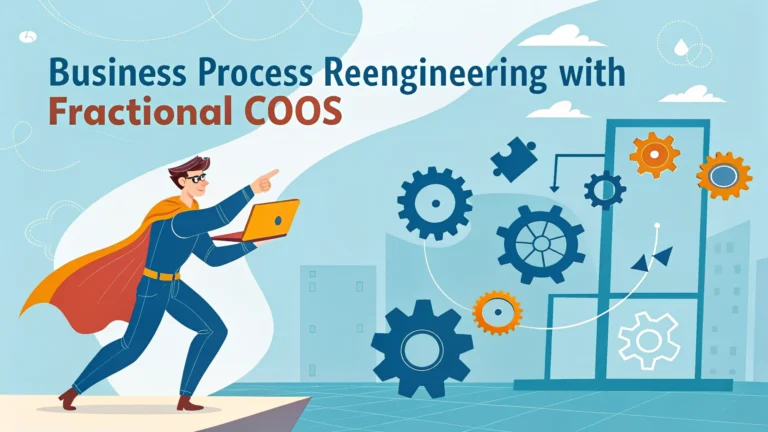Business Process Reengineering (BPR) represents a fundamental rethinking and redesign of business operations to achieve substantial improvements in performance metrics.
A Fractional COO brings specialized expertise to guide organizations through complex BPR initiatives without the cost commitment of a full-time executive.
This guide explores how businesses can leverage fractional leadership to implement effective process reengineering strategies and achieve operational excellence.
Key Components of Business Process Reengineering
- Process mapping and analysis
- Technology integration assessment
- Workflow optimization
- Performance metrics establishment
- Change management planning
How Fractional COOs Drive BPR Success
A Fractional COO typically dedicates 10-20 hours per week to oversee the BPR initiative, ensuring focused leadership without full-time overhead costs.
These executives bring diverse industry experience and best practices from multiple organizations, enriching the reengineering process with proven methodologies.
Steps to Implement BPR with a Fractional COO
- Initial Assessment
- Review current processes
- Identify bottlenecks
- Define improvement targets
- Strategy Development
- Create implementation roadmap
- Set measurable objectives
- Allocate resources
- Execution
- Monitor progress
- Adjust strategies as needed
- Document results
Common BPR Challenges and Solutions
| Challenge | Solution |
|---|---|
| Employee resistance | Implement clear communication strategies and training programs |
| Resource constraints | Prioritize high-impact changes and phase implementation |
| Technology gaps | Partner with suitable technology providers and plan gradual adoption |
Measuring BPR Success
Track these key performance indicators (KPIs) to evaluate the effectiveness of your BPR initiatives:
- Process cycle time reduction
- Cost savings
- Customer satisfaction improvements
- Employee productivity gains
- Error rate reduction
Finding the Right Fractional COO
Look for these qualifications when selecting a Fractional COO for your BPR project:
- Minimum 10 years of operational leadership experience
- Track record of successful BPR implementations
- Industry-specific knowledge
- Strong change management skills
- Technical expertise in relevant systems
Moving Forward with BPR
Connect with professional organizations like the Association for Operations Management (APICS) or the Institute of Management Consultants (IMC) to find qualified Fractional COOs.
Contact these organizations directly:
- APICS: www.apics.org | 1-800-444-2742
- IMC: www.imcusa.org | 1-800-221-2557
Cost-Benefit Analysis
Typical ROI metrics for BPR initiatives led by Fractional COOs include:
- 20-30% reduction in operational costs
- 40-50% improvement in process efficiency
- 15-25% increase in customer satisfaction scores
Implementation Timeline
| Phase | Duration | Key Activities |
|---|---|---|
| Planning | 4-6 weeks | Assessment, strategy development, team alignment |
| Implementation | 3-6 months | Process redesign, system integration, training |
| Optimization | 2-3 months | Fine-tuning, measuring results, documenting procedures |
Risk Management Strategies
Primary Risk Factors
- Scope creep
- Budget overruns
- Technical complications
- Stakeholder misalignment
Mitigation Approaches
- Weekly progress reviews
- Detailed documentation requirements
- Clear escalation procedures
- Regular stakeholder updates
Maximizing Long-Term Value
To ensure sustained benefits from your BPR initiative:
- Document all process improvements
- Establish ongoing training programs
- Create feedback mechanisms
- Schedule regular performance reviews
- Plan for continuous improvement cycles
Transforming Operations for Future Success
Successful BPR implementation through fractional leadership creates a foundation for sustainable operational excellence. Organizations must maintain momentum by regularly reviewing and updating processes, while leveraging the expertise of experienced Fractional COOs to guide their continuous improvement journey.
Start your BPR initiative by conducting a thorough assessment of your current operations and engaging with qualified fractional leaders who can help transform your business processes for competitive advantage.
FAQs
- What is Business Process Reengineering (BPR) and how does a Fractional COO implement it?
Business Process Reengineering is a fundamental rethinking and radical redesign of business processes to achieve dramatic improvements in critical measures like cost, quality, service, and speed. A Fractional COO implements BPR by analyzing current processes, identifying inefficiencies, and redesigning workflows while working part-time with organizations. - How does a Fractional COO determine which processes need reengineering?
They analyze key performance indicators (KPIs), conduct process audits, gather employee feedback, and review customer complaints to identify bottlenecks and inefficient processes that impact business performance and customer satisfaction. - What are the typical timeframes for BPR projects with a Fractional COO?
BPR projects typically take 3-6 months for small to medium processes and 6-12 months for enterprise-wide transformations. Fractional COOs usually dedicate 10-20 hours per week to these projects. - What technology tools do Fractional COOs use in BPR?
They utilize process mapping software, workflow automation tools, enterprise resource planning (ERP) systems, project management platforms, and data analytics tools to analyze and redesign business processes. - How do Fractional COOs manage resistance to change during BPR?
They implement change management strategies, including clear communication plans, stakeholder engagement, employee training programs, and phased implementation approaches to minimize resistance and ensure buy-in. - What metrics do Fractional COOs use to measure BPR success?
Key metrics include process cycle time reduction, cost savings, error rate reduction, customer satisfaction scores, employee productivity improvements, and return on investment (ROI) calculations. - How do Fractional COOs ensure process improvements are sustainable?
They establish documentation standards, implement training programs, create process governance frameworks, set up monitoring systems, and develop continuous improvement protocols before concluding their engagement. - What industries typically benefit from BPR with Fractional COOs?
Manufacturing, healthcare, financial services, technology companies, and professional services firms commonly benefit from BPR initiatives led by Fractional COOs, particularly when experiencing growth or operational challenges. - How much does BPR with a Fractional COO typically cost?
Costs vary based on project scope and complexity, but typically range from $5,000-$15,000 per month for Fractional COO services during BPR initiatives, offering a cost-effective alternative to full-time executives. - What qualifications should organizations look for in a Fractional COO for BPR?
Look for professionals with proven BPR experience, relevant industry knowledge, change management expertise, technology implementation experience, and a track record of successful process optimization projects.







